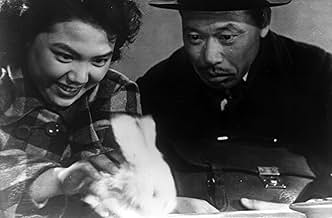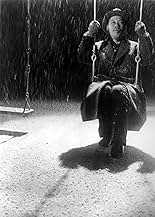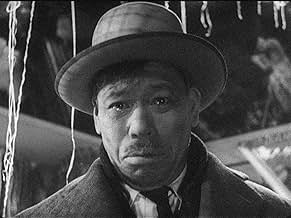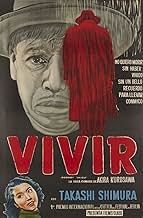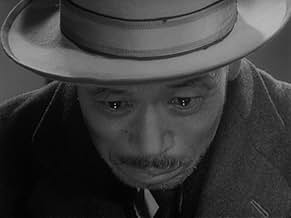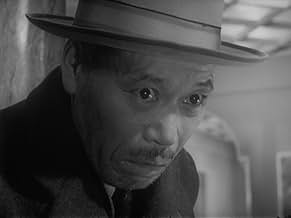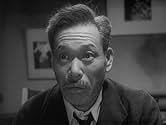Un bureaucrate essaie de trouver un sens à sa vie suite à la découverte qu'il a un cancer en phase terminale.Un bureaucrate essaie de trouver un sens à sa vie suite à la découverte qu'il a un cancer en phase terminale.Un bureaucrate essaie de trouver un sens à sa vie suite à la découverte qu'il a un cancer en phase terminale.
- Director
- Writers
- Stars
- Nominé pour le prix 1 BAFTA Award
- 6 victoires et 2 nominations au total
Avis en vedette
Probably one of the most difficult aspects a film like "Ikiru" has to overcome is the very rough march of time. To actually find someone these days, let's say a crowd of regular movie-goers to sit down and watch a film about an old Japanese man dying of cancer would be too much to ask.
Long held shots, hardly uplifting subject, to westerners very foreign. An array of reasons not to see it. And yet, once you actually start getting into the picture it doesn't let you go. Which is why it may be rightfully considered to be a classic.
Of all of Kurosawa's films this is probably the one movie that works perfectly on a universal level. Because at its core it is about one of the most basic desires of human existence...namely to be able to look back on your life and say "It was worth it."
In its starch and unforgiving black-and-white form the movie records the time of one man's life in such a beautiful and yes, colorful way, that by the time the final moments of the film play out, it will be very hard for anybody not to be touched. A glorious moment in 20th century cinema, that will hopefully be preserved for decades to come.
Long held shots, hardly uplifting subject, to westerners very foreign. An array of reasons not to see it. And yet, once you actually start getting into the picture it doesn't let you go. Which is why it may be rightfully considered to be a classic.
Of all of Kurosawa's films this is probably the one movie that works perfectly on a universal level. Because at its core it is about one of the most basic desires of human existence...namely to be able to look back on your life and say "It was worth it."
In its starch and unforgiving black-and-white form the movie records the time of one man's life in such a beautiful and yes, colorful way, that by the time the final moments of the film play out, it will be very hard for anybody not to be touched. A glorious moment in 20th century cinema, that will hopefully be preserved for decades to come.
10OttoVonB
Ikiru ("to live")is a Kurosawa film devoid of samurai or Toshiro Mifune. It is an oddity in his canon, neither an adaptation, nor an epic, or even a detective story. Instead, it is the simple and touching story of the last months of the life of a man, Watanabbe, public official, who decides to give a meaning to his life by transcending the obtuse and stiff mind of government bureaucracy to get a small public children's park built. As a parable for the soulless workings of modern bureaucracy, the goal is set pretty high, and Kurosawa goes even further, giving this story a lot of character, frequent humor, life and, most of all, heart. And going beyond the strengths of the direction and script, is the central performance by Takashi Shimura (later Kambei in Seven Samurai). Shimura gives his character such a transparently good heart and such great pain that every second of Watanabe's plight and struggle tugs at your heart, not in an overwhelmingly sentimental manner, but in one than feels honest and pure. If even many hardened souls will be drawn to tears, it is not for pity, but, admirably, because of envy for Watanabe's beautiful human dignity in the end, and for a film to have such power is beyond pure accomplishment, as the need to see this and, more importantly, feel it, goes beyond pure necessity...
Kanji Watanabi is a quiet, melancholy man who has spent all his life behind his office desk doing sweet eff-all. When he is diagnosed with stomach cancer he realizes that he has been petty much dead his whole life, and searches desperately for away to live again.
This is Akira Kurosawa's masterpiece, yes, even better than Rashomon and The Seven Samauri. It is a perfect true story of everybody's life- how we don't even realize we have it until we know it will be over in a short while. Watanabi's quest for self-discovery is one of the greatest from any motion picture ever made. The all-too-true paradox is one to end all paradoxes- that Watanabi is dead, and had been all his life, until he realized he was sick, which is when he began living for the first time. Takashi Shimura, the actor best known for his role as the wise, bald-headed Samauri in The Seven Samauri, and the professor out of the early Godzilla films, plays Watanabi perfectly- in my mind, it's one of the greatest film performances of all time.
Not everyone will love this movie. It was made a long time ago, the main character is an old fogey, it has subtitles, and it's pretty long. Many people today, especially young kids, would find it boring. Well, let 'em. There's no need to worry about them, they'll always have Pirates of the Carribbean, they'll always have The Matrix. Leave Ikiru and films like it to the true lovers of cinema.
This is Akira Kurosawa's masterpiece, yes, even better than Rashomon and The Seven Samauri. It is a perfect true story of everybody's life- how we don't even realize we have it until we know it will be over in a short while. Watanabi's quest for self-discovery is one of the greatest from any motion picture ever made. The all-too-true paradox is one to end all paradoxes- that Watanabi is dead, and had been all his life, until he realized he was sick, which is when he began living for the first time. Takashi Shimura, the actor best known for his role as the wise, bald-headed Samauri in The Seven Samauri, and the professor out of the early Godzilla films, plays Watanabi perfectly- in my mind, it's one of the greatest film performances of all time.
Not everyone will love this movie. It was made a long time ago, the main character is an old fogey, it has subtitles, and it's pretty long. Many people today, especially young kids, would find it boring. Well, let 'em. There's no need to worry about them, they'll always have Pirates of the Carribbean, they'll always have The Matrix. Leave Ikiru and films like it to the true lovers of cinema.
Ikiru is a film about life. Constantly complex and thought-provoking, although simple at the same time; it tells a story about life's limits, how we perceive life and the fact that life is short and not to be wasted. Our hero is Kanji Watanabe, the most unlikely 'hero' of all time. He works in a dreary city office, where nothing happens and it's all very meaningless. Watanabe is particularly boring, which has lead to him being nicknamed 'The Mummy' by a fellow worker. He later learns that he is dying from stomach cancer and that he only has six months to live. But Watanabe has been dead for thirty years, and now that he's learned that his life has a limit; it's time for Watanabe to escape his dreary life and finally start living. What follows is probably the most thoughtful analysis of life ever filmed.
Ikiru marks a departure for Akira Kurosawa, a man better known for his samurai films, but it's a welcome departure in my opinion. Kurosawa constantly refers to Watanabe as 'our hero' throughout the film, and at first this struck me as rather odd because, as I've mentioned, he's probably the least likely hero that Kurosawa has ever directed; but that's just it! This man is not a superhero samurai, but rather an ordinary guy that decides he doesn't want to be useless anymore. That's why he's 'our hero'. Kurosawa makes us feel for the character every moment he's on screen - we're sorry that he's wasted his life, and we're sorry that his wasted life is about to be cruelly cut short. However, despite the bleak and miserable facade that this movie gives out, there is a distinct beauty about it that shines through. The beauty emits from the way that Watanabe tries to redeem his life; because we feel for him and are with him every step of the way, it's easy to see why Watanabe acts in the way he does. Ikiru is a psychologically beautiful film.
It could be said that the fantastic first hour and a half is let down by a more politically based final third - and this is true. The movie needs it's final third in order to finish telling the story, but it really doesn't work as well as the earlier parts did. However, Kurosawa still delights us with some brilliant imagery and the shot of Watanabe on a swing is the most poetically brilliant thing that Kurosawa ever filmed. Together with the music and the rest of the film that you've seen so far; that picture that Kurosawa gives us is as moving as it is brilliant.
Ikiru marks a departure for Akira Kurosawa, a man better known for his samurai films, but it's a welcome departure in my opinion. Kurosawa constantly refers to Watanabe as 'our hero' throughout the film, and at first this struck me as rather odd because, as I've mentioned, he's probably the least likely hero that Kurosawa has ever directed; but that's just it! This man is not a superhero samurai, but rather an ordinary guy that decides he doesn't want to be useless anymore. That's why he's 'our hero'. Kurosawa makes us feel for the character every moment he's on screen - we're sorry that he's wasted his life, and we're sorry that his wasted life is about to be cruelly cut short. However, despite the bleak and miserable facade that this movie gives out, there is a distinct beauty about it that shines through. The beauty emits from the way that Watanabe tries to redeem his life; because we feel for him and are with him every step of the way, it's easy to see why Watanabe acts in the way he does. Ikiru is a psychologically beautiful film.
It could be said that the fantastic first hour and a half is let down by a more politically based final third - and this is true. The movie needs it's final third in order to finish telling the story, but it really doesn't work as well as the earlier parts did. However, Kurosawa still delights us with some brilliant imagery and the shot of Watanabe on a swing is the most poetically brilliant thing that Kurosawa ever filmed. Together with the music and the rest of the film that you've seen so far; that picture that Kurosawa gives us is as moving as it is brilliant.
I too have seen all the Samurai films. It was gratifying to watch this tender little film. How would we act if we knew when the end was coming? There are so many terrifying and tender moments in this film. The scenes with the young office mate went from charming to cold-- we knew there was no more than companionship, but she can't really even give him that anymore. The scene when he is about to tell his son about his condition and the young man goes off on a rant about how embarrassingly his father has been acting actually brought me to tears. Of course, it's the price he pays for his cold distance all those years. Then there's the whole bureaucratic nightmare of the office. Even at the wake they don't want to give credit. All the buck passers want a share of his legacy. Maybe families who are living on the edge should watch this movie. Even after more than 50 years, it wears extremely well.
Le saviez-vous
- AnecdotesWhen Takashi Shimura rehearsed his singing of "Song of the Gondola," director Akira Kurosawa instructed him to "sing the song as if you are a stranger in a world where nobody believes you exist."
- GaffesWhen Kanji and the Novelist go to a busy, loud nightclub, the film has been reversed as evidenced by the backwards "Nippon Beer" banner in the background.
- ConnexionsFeatured in The Siskel & Ebert 500th Anniversary Special (1989)
- Bandes originalesJ'ai Deux Amours
(uncredited)
Music by Vincent Scotto
Lyrics by Georges Koger and Henri Varna
Performed by Josephine Baker
[Played when entering the bar with the long-faced man]
Meilleurs choix
Connectez-vous pour évaluer et surveiller les recommandations personnalisées
Détails
Box-office
- Brut – États-Unis et Canada
- 60 239 $ US
- Fin de semaine d'ouverture – États-Unis et Canada
- 2 149 $ US
- 29 déc. 2002
- Brut – à l'échelle mondiale
- 114 026 $ US
- Durée2 heures 23 minutes
- Couleur
- Mixage
- Rapport de forme
- 1.37 : 1
Contribuer à cette page
Suggérer une modification ou ajouter du contenu manquant


![Regarder Trailer [OV]](https://m.media-amazon.com/images/M/MV5BMTg4OWJkNjMtM2Y0Mi00MzQ5LTk3Y2YtZWMwNGUyOTIyNGVjXkEyXkFqcGdeQXRyYW5zY29kZS13b3JrZmxvdw@@._V1_QL75_UX500_CR0)
